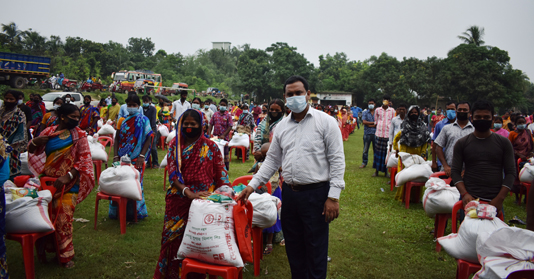RAJSHAHI, July 10, 2020 (BSS)- Over 400 poor and extreme poor families including 272 ethnic minorities consisting around 2,000 people were given food support in order to enable them to fight the novel coronavirus (COVID-19) pandemic.
Each of the households was given 20 kilograms of rice, five kilograms of potatoes, two kilograms of lentil and salt each, one kilogram of edible oil, suji and sugar each, three soaps, three face masks and some emergency medicines like paracetamol, vitamin C and anti-histacin tablet and saline packet as response to the Covid-19.
DASCOH Foundation distributed humanitarian assistance on behalf of the ‘Promotion of Social Partnership for Empowerment of Marginalized Communities project’ with financial support of BMZ and NETZ through maintaining social distancing and other health protective measures.
Upazila Nirbahi Officer Liton Sarker, Upazila Vice-chairman Khadijatul Kobra, Union Parishad Chairmen Mostofa Shah Chowdhury, Nazrul Islam and Sadek Uddin and Area Coordinator of DASCOH Foundation Jahid Ali joined the distribution programme held at Patnitala Sheikh Russel Mini Stadium in Naogaon district on Thursday.
Talking to BSS on the issue, Jahid Ali said the supports were given in the poverty pockets of Patnitala, Nazipur, Krishnapur and Patichara Unions under the upazila and the support is expected to secure food intake of the recipient families for two to three weeks.
The project has been working in the areas focusing its support on income and food security for extremely poor people, primary education for children of extreme poor families and promotion of human rights.
Main thrust of the current support package is to enable them to avoid starvation and refrain themselves from forced sale of productive assets that they had received earlier as a part of livelihood development support initiated on behalf of the project.
Ali said many of the support receivers who are mainly agri-labourers have already borrowed money from informal sources and fallen to the trap of advanced labour sale in their locality.
He mentioned more humanitarian support will be required to secure their food intake to overcome the long term negative impacts of the ongoing troubled situation including shrinking income opportunities of the extreme poor vulnerable groups.



